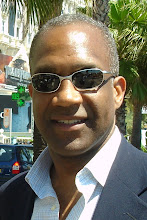
Dear Mom,
Thank you for marrying Daddy.
It's not that
you need
me to thank you for more than 50 years of marriage (see photo from Golden Wedding anniversary reception in 1994) and six children (all of whom are living productive, independent, lives), but for all of the times I wanted to say it -- and didn't; and for all of the times I should have said it -- and wouldn't: Thank you for marrying Daddy.
It has been 10 years this past January that Daddy died with you at his bedside holding his hand. Since then, I have been acutely conscious of the greatness of the man you called by his first and middle initials: "L. C."
Based on what we see and hear these days, it seems that the average man is clueless as to what it means to be a
real man. A few years ago, I was given a book -- written by a Colorado Springs "mountain man" -- that had become a bible in many gatherings of Christian men. No doubt, the writer was being handsomely remunerated for helping hundreds of middle-age "boys" to man-up. I just couldn't take seriously the writer -- or his writings. You see, I had been there, when I
really was a boy.
A boy's perspective is a peculiar one. Everything seems too large to grasp, while at the same time strangely achievable. I first began to see the world from the front seat of Daddy's car.
He took me with him on errands, and on home visits to shut-in members of the church he served as pastor. He was my primary source for answers to my questions about the what and why of things I had heard or seen in those car rides.
I was his frequently reluctant partner in home building projects, my first being the erection of a swing set in the back yard of the parsonage in Hutchinson, Kansas. He also was like Moses (more the lawgiver than the wilderness guide in this example), who promised death (or, more accurately, the wish that one were dead) for lying, stealing, insubordination, and poor school grades.
Mark Twain once said that when he was a teenager, his father was the most ignorant man on earth. But when Twain became a young man in his early twenties, he was amazed at how wise his father had become in only a few years.
Like Twain, I am exceedingly grateful that Daddy lived long enough for me to realize how wise he had been all along; and for the opportunity to draw on that wisdom as I made my way in the world. I know that not all boys grow up in homes with their fathers. Death, divorce; or as is commonly the case today, unwed motherhood paired with absentee fatherhood, have created a situation that psychologists, pundits, and pastors work tirelessly to remedy.
As a man, I can see many things that I could not appreciate while a boy. First, Daddy loved you very much. I never heard him say an unkind word about you, and heaven help anyone who did. Second, Daddy was serious about his faith in Jesus. This is not to say that he lived perfectly, but he was unwilling to ignore or to change the standard, even when by the standard he had fallen short. Third, he was serious about "raising" his two sons into men.
In the Bible, it says that "as iron sharpens iron, so one man sharpens another." (Proverbs 27: 17) Yes, Daddy was often as hard as granite, and as unyielding as iron, but it was not without its benefit. Because of him, I know the value of honesty; the cost of freedom; the necessity of family; the benefit of a prepared mind; and the all-sufficiency of God.
And as the icing on the cake, because of him I know how to safely handle firearms, catch a fish, defend myself with my hands, cry when moved, and shave with a straight-edge razor.
As cool as all of this may be, it started with you. Thanks for saying yes to "L. C." Thanks for marrying my Daddy!
Love,
CHUCKY
 Just when we begin to think that a fat bank account, powerful friends, and smart lawyers are all it takes to tip the scales of Justice, the recent arrest of cinema darling Roman Polanski (pictured) reminds us that even in this life, while you may get-by, you don't always get-away.
Just when we begin to think that a fat bank account, powerful friends, and smart lawyers are all it takes to tip the scales of Justice, the recent arrest of cinema darling Roman Polanski (pictured) reminds us that even in this life, while you may get-by, you don't always get-away. 







